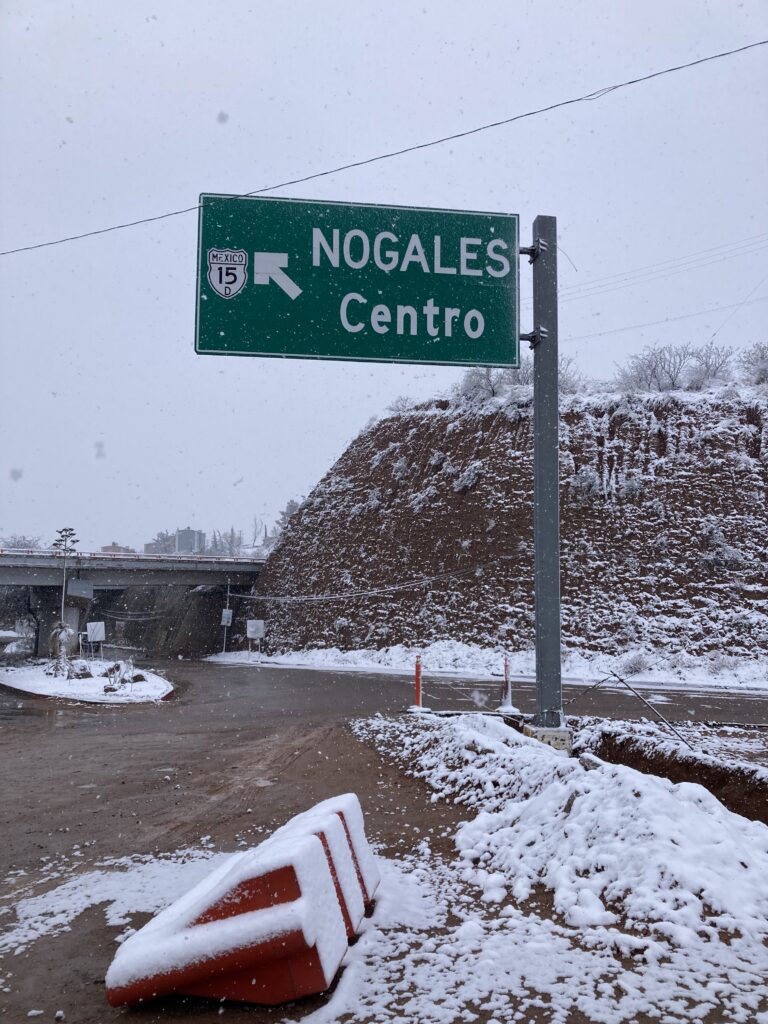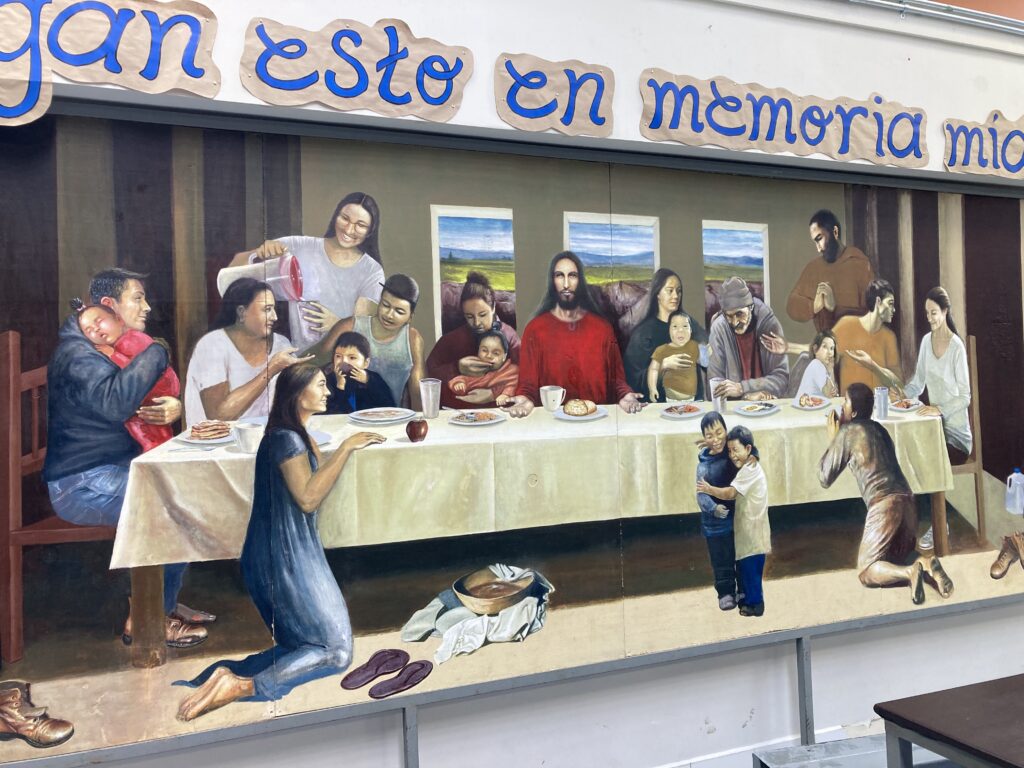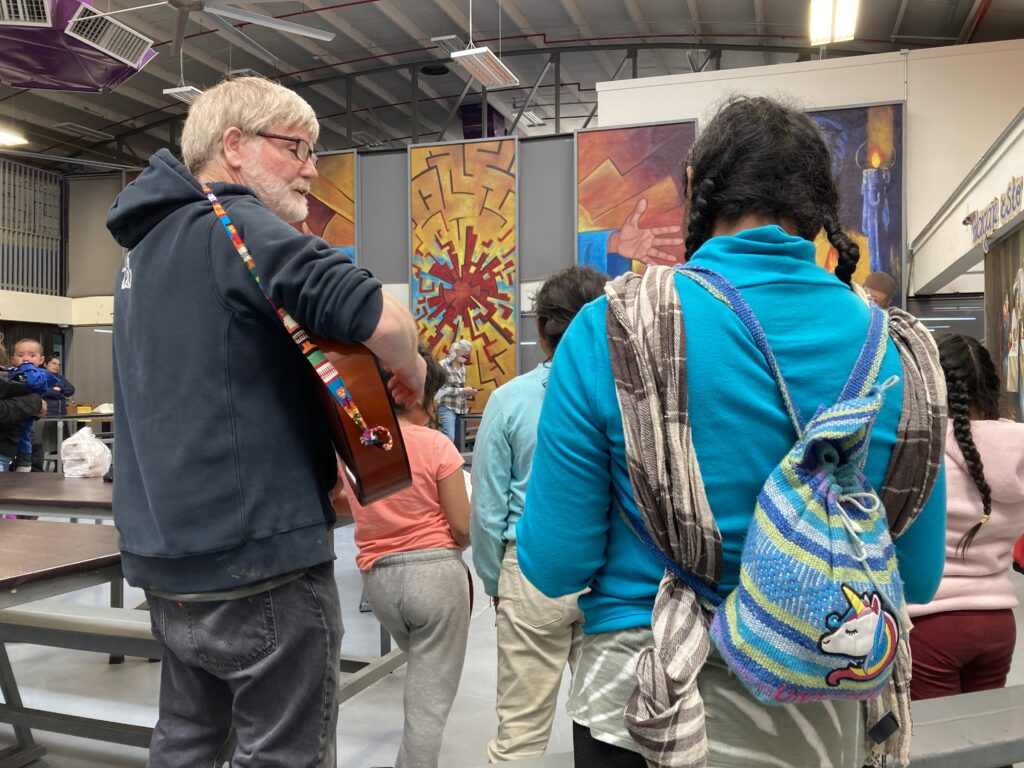February 26, 2023
It is 8:43 am. I am pulling off the freeway in search of the pin that Tracey, the Sister of Providence who is, along with two others, hosting me in Southern Arizona, dropped where there is supposedly a dirt lot with free parking right beside the Mariposa port of entry. During the drive it was raining hard, and as I am pulling off the road to park, it begins to snow! I am not dressed for snow and I am laughing because I am in the desert and yesterday it was 67 degrees.
The walk to the comedor is longer than I anticipated, so my shoes get thoroughly wet. I am wandering down an endless outdoor corridor that is a mix of dirt and gravel which is visually and environmentally nice but gets in my shoes. It weaves and wanders and I wonder if, when, I will pass through an office to present myself and/or my passport. I pass through the open gate in the border wall and immediately the pathway ends, interrupted by unfinished construction. I walk into the street where the cars pass inspection and look for the pedestrian pathway. There is a sidewalk but it leads to a dead end.
“Disculpe, donde debo pasar?” I ask a person off in the distance who may be a customs agent or national guard – I wasn’t paying close attention. They gestured me towards a path in front of the little Aduana offices where people can (theoretically) apply for “permisos” or declare goods. I am mostly walking on this sidewalk to avoid the flooded road – there is no turnstile or person waiting to ask me who I am. At the end of the building I get back into the street and cross the road. I double check google maps that I am to go left, and as I turn the corner I see Kino.

I present myself to the portero, who leads me to the kitchen and drops me off there. For about 5 minutes, I am chopping bell peppers that will be cooked and go into a salsa tomorrow with the chicharrones. In the kitchen is Hilda, one of the cooks, as well as Luz Elena, one of the Missionaries of the Eucharist who is the kitchen coordinator. There are also a few other American volunteers who are chopping with me. When we finish, it is time to serve breakfast, so I stand outside and give people tortillas with my bare hands. We are serving eggs scrambled with peppers, tomatoes and onion, and frijoles. I switch to the plate serving when most of the people have eaten and some of the early morning volunteers depart.
After cleaning up the breakfast routine, I was put to work cutting beef. It had been previously frozen, so was a bit cold, and the Hermana told me that my fingers might freeze.
“Está bien si picas la carne, o eres vegetariana?” she asks me while we are hovering over the giant bag of meat in the sink. “I am a vegetarian, but I don’t mind cutting meat! I just don’t really know how to cook it.” I then explain that I am really a flexitarian – if I go to someone’s home and they serve me meat, especially from a different culture, I will humbly eat it, but I don’t buy it or prepare it for myself.
I slice the raw beef and the Sister puts cumbia music on. Since it is my first day, I have no idea what to expect – I haven’t really received a tour or an explanation, but the meat cutting is important and I pray over it, that it turns out delicious and puts big smiles on peoples faces. A good meal can (and should!!) do that.
I am volunteering at Kino Border Initiative, a now 15-year-old organization that began as a hot-meal and first aid center for people deported from the United States (Centro de Atención al Migrante Deportado) operated by the Missionaries of the Eucharist, and is now sponsored by the Jesuits. (Check out their instagram!) One of the unique things about KBI is that it is one of few organizations that both accompanies vulnerable, marginalized peoples AND does advocacy at the local, regional, and federal level, which gives it a uniquely profound and well-rounded perspective. Their vision is migration with dignity.

Around 11:30 am, the volunteers come into the kitchen from around the building and start making plates for lunch. I make my own, sit down, and begin talking with some of them at the table. I explain that I come primarily to learn about the organization, to see how it functions, to be inspired by its programs and protocols. I tell one of the volunteers that I spent two years at Annunciation House, and her jaw drops. “You are way overqualified to be working in the kitchen here!” she says, and another chimes in. “If you want to learn best practices, you can’t spend your time here chopping onions.”
I am humbled by their immediate reception of my ideas and my pilgrimage purpose. My “quest” as some have suggested :). In the few morning hours, I have actually learned quite a lot, although I know it is the tip of the iceberg. I have such a posture of not wanting to be a burden, of not wanting to inconvenience people, that I prefer to enter in as a nobody and do exactly what others see needs to be done. As the days go by, I know I will see more and hear more and learn more.
At some point in our lunchtime I turn to my left where Fr. Ray, a retired Diocesan priest, begins asking me about my time at Catholic Charities. I pray that all of my former coworkers and the organization and the bishop forgive me, but I can’t help but talk about how much that job and work environment really hurt my mental and spiritual health. I talk about its negatives primarily because I believe it could be so much better. I talk about my journey, what I am trying to discover and uncover, and he tells me it gives him hope.
He shares with me what he is doing (well, to be clear, he actually isn’t quite sure what he is doing, but is discovering as he goes) and how he is working in a seminary in Chicago. He will speak on a panel about his experience here very soon, and he is participating in the overhaul of a curriculum for the seminarians, which focuses on social doctrine. He tells me that a lot of the seminarians lean conservative, and one of their primary intentions for entering the seminary is to study doctrinal truth. This leads us into a conversation about who God is, and what the Church teaches, and the different theologies that exist, and mysticism. We talk about the church leadership response to LGBTQ peoples in relation to their identities, about Catholic ministries for people diagnosed with HIV and AIDS in the world (check out the podcast Plague). I am energized by the bustling space and so I talk a lot and probably too much.
We serve some lunch to a smaller crowd, and shortly after we have Catholic Mass in the dining room. During the homily, the priest, Fr. Joe, talks about that we are in a desert, and Jesus was in the desert in the readings, and the emotional deserts of being in migration with unknown futures. At the end of Mass, he invites the people to share something they are grateful for with respect to Kino Border Initiative. Many mothers stand up and give thanks to God and the volunteers and the people. He asks if any men would like to share, but they remain shy.
After Mass, we put the benches back under the tables and most of the volunteers pack up and begin saying goodbye. Fr. Ray comes back to me because he wants to stay connected. Since the people who were giving me guidance in the morning are now leaving, I decide that I will leave too, even though it is only 3pm and I don’t have plans. I walk outside to sunny, clear skies, and back down to the border crossing, filled with delight.

